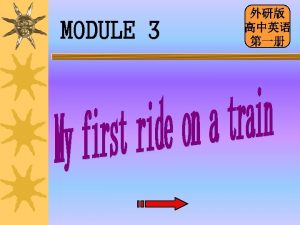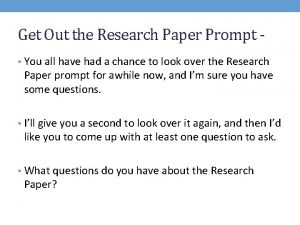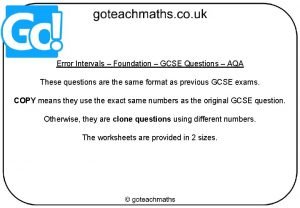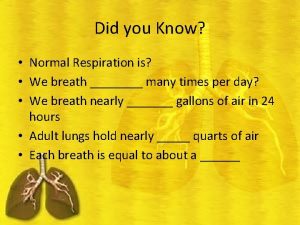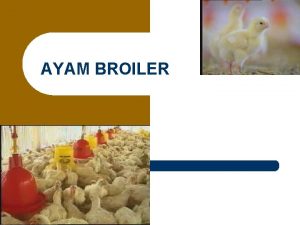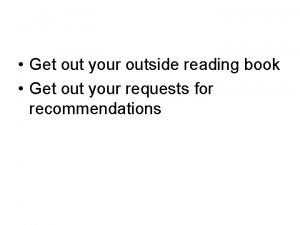Get Out the Research Paper Prompt You all












- Slides: 12

Get Out the Research Paper Prompt • You all have had a chance to look over the Research Paper prompt for awhile now, and I’m sure you have some questions. • I’ll give you a second to look over it again, and then I’d like you to come up with at least one question to ask. • What questions do you have about the Research Paper?

Three Building Blocks of Persuasive Writing: • The Issue: This is the topic, subject, or controversial issue you have chosen to write about. • The Claim: This is a statement of opinion or value judgment about the issue. (This should be your thesis statement. ) • The Evidence: This is the reasonable, logical support that explains and backs up the claim you have made about the issue. (This will come from your research and your own conclusions you make having read extensively about your topic. )

Evaluating Arguments • The chapter of your textbook we will be working with for this essay: • Everyone’s an Author: “This is Where I Stand” Chapter 7, pages 61 --100

Activity: Read and Evaluate a Position Argument on a Civic/Social Issue • Read the essay “Our Schools Must Do Better” by Bob Herbert • As a group, answer questions 3 and 4 • Write down your answers, and make sure everyone signs the paper. • A few things to note about this Essay: • It is a position argument, but it is also partly a personal narrative. • kind of a combination of our first essay AND out last one! • It is also an op-ed column, not an academic essay. This means that his audience, and thus his format and style, are slightly different than what I am asking you to write. • Note that while it is well-argued and logical, it is not supported by research. Your research paper will be supported by research and quotes/citation.

The Research Question: As you write your research paper, go in with an open mind and form your claim as you do your research. • You should have a research question in mind when you do your research. • Sample research questions: • • • What types of schools are most effectively raising test scores in lowperforming areas? What are they doing that makes them successful? What are charter schools? Why might a student want to attend one as opposed to a normal public school? Should the creation of more charter schools be supported by local governments?

A Good Research Question: 1. Should be NARROW and SPECIFIC enough that it can • be explored fully in a paper of the assigned length. Don’t choose a topic that’s too big. I understand you are all worried about reaching the minimum page count. BUT here’s a secret about writing—the more specific you get the more you will actually have to write about. If you make your topic too big because you are scared of not having enough to say, you will end up with a vague, unspecific, generalized mess. Don’t be scared! We will work on narrowing down our topics in class. I can also help if you email me. • • • 2. Asks a question that not everyone will agree on or answer in the same way. • • “Should schools work to raise student performance? ” is not a good research question. No one is going to say “No” to this question.

A Good Research Question: 1. Avoids asking questions that can be answered in one or two words/numbers. • For example, “How many students weren’t able to read at their grade level last year in Ventura County? ” is a specific question, but once you find the number, you’re done. 2. Asks a question about how something happens, why something happens, the significance of something that happens, or the consequences of something that happens. • • In other words, “Why does this question matter? ” Does it pass the “so what” test?

Let’s Take a Second Look at Those Good Research Questions: 1. 2. What types of schools are most effectively raising test scores in low-performing areas? What are they doing that makes them successful? What are charter schools? Why might a student want to attend one as opposed to a normal public school? Should the creation of more charter schools be supported by local governments? An Important Fact about Research Questions: • Notice that neither of these example questions makes a claim yet. I haven't done the research, so I don’t know what point of view I'm going to have about this issue. • DO NOT ask a research question you think you already know the answer to. Ask a question you are genuinely curious about, and go in with an open mind. • Do your Research FIRST. My advice? Do at least some of your research THIS WEEKEND.

Rough Research Question • Think about the topics you brainstormed last week. • Think of at least one research question for that topic. • Make sure it is • not too “big” or vague/general • specific • can be answered in more than one or two words • and open-ended.

Ok, I have a research question. Now what? • Continue working on them. Change and add to them as you research. • What knowledge/experience do you bring to the topic? • What do you still need to find out? • What are issues or sides of the topic you know you will need to explore in order to find out what your claim (thesis) is going to be?

Preview for Upcoming Weeks: What is counterargument? • Counterargument is where you briefly include the opposite side of what you are arguing to show your side is different. You will need to include counterargument in your research paper. • Example: Many people believe that voting is not important. They say that due to the way the American electoral college functions in our presidential elections, “individual votes don’t really count” (Smith). However, this is misinformed. First of all, the electoral college only applies to the presidential election and not to local elections that have a greater impact on life in your state or county. Secondly… • NOTE: Including a counterargument will not weaken your paper, in fact it will make your paper stronger. That is, IF you then ANSWER the counterargument with a well-thought-out response.

Next Week and Beyond • Check the class blog for next week’s homework. • Yes, it is a lot of reading. SKIP THE READINGS AT YOUR OWN RISK! • Also, take a look at the upcoming week’s so you know what is coming up. PACE YOURSELF. • Tuesday, April 29 - Topics: Conducting Research—The Internet and Beyond • Homework Due: • Read “Finding Sources” p. 340— 353 • Thursday, May 1 - Topics: Keeping On-Track and Choosing Sources Wisely. • Homework Due: • Read “Keeping Track: Managing Information Overload” p. 362 --366 • Read “Evaluating Sources” p. 367 --371
 Alliteration in one direction songs
Alliteration in one direction songs Get on / get off transport
Get on / get off transport Discriminatory stimuli
Discriminatory stimuli Response prompt vs stimulus prompt
Response prompt vs stimulus prompt Research paper prompt
Research paper prompt A piece get out of paper
A piece get out of paper What is the highest mark you can get on a foundation paper
What is the highest mark you can get on a foundation paper What is an error interval
What is an error interval It's not paranoia if they really are out to get you
It's not paranoia if they really are out to get you What happens when you get the wind knocked out
What happens when you get the wind knocked out Sistem all in all out
Sistem all in all out Qualitative research
Qualitative research 2 samuel 9 nlt
2 samuel 9 nlt

